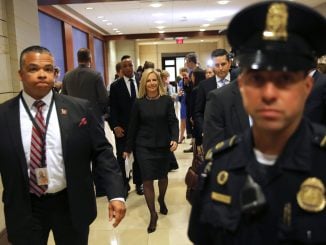RALEIGH — The Public Interest Legal Foundation (PILF) has issued a report citing nearly 8,000 deceased registrants and tens of thousands of interstate duplicate registrations on North Carolina voter rolls.
The PILF report lists 7,933 deceased North Carolinians as still registered to vote in 2020 and states that in Spring 2020, “roughly 12,940 deceased registrants were found (ranking the state 8th in the nation).”
“North Carolina officials need to use the time they still have to prepare voter rolls for the midterm elections,” PILF President J. Christian Adams said in a statement. “Time is running out. Silly, obvious errors in the voter roll can create opportunities for voter fraud and chaos in a close election. Correcting deceased and duplicate records now will help to preemptively address those risks.”
In a statement, PILF offered examples of deceased voters still on the rolls long after their deaths. One example given was Hoyle Helms, “a World War II vet, died in 1997 when Clinton was President. Following his death, he remained on the voter rolls for nearly 25 years.” Another was a woman who died in 2003 but remained registered to vote almost two decades later.
According to the report, 42,984 North Carolina voter registrants left the state and established or renewed their out-of-state voter registration before the 2020 Election and 13,525 North Carolinians managed to become registered twice in North Carolina under variations of their names.
Additionally, the report says that with 2,860 ballots mailed were undeliverable and there were “nearly 86,000 unaccounted for ballots requested by the voters.” PILF says that during the 2020 election, some 15 million mail ballots went unaccounted for nationwide and another 1.1 million were returned as USPS-undeliverable.
“In other words, local authorities do not know what happened to the ballots,” PILF’s report states. “Put into the context of the 2020 presidential election, for almost every ballot President Donald Trump won over then candidate Joe Biden, another went to an old address or is missing.”
N.C. State Board of Elections Communications Director Patrick Gannon responded in an email to a request for comment, stating that “The State and County Boards of Elections in North Carolina remove ineligible voters from the voter registration database as required by state and federal law and the State Board’s voter list maintenance policy.”
Gannon included a copy of the policy in his response, as well as some background comments.
“PILF’s report is spare on the details of its methodology, which is important because small details in how one goes about identifying potential matches among various databases can lead to significant overcounting errors,” wrote Gannon.
Gannon offered an example that elections officials in the state use an “officially approved Postal Service vendor for National Change of Address information, use careful matching criteria to avoid erroneous overinclusion, and carry out the federally mandated process for removing voters who have moved, per 52 U.S.C. § 20507(c).”
Gannon suggested that PILF’s report “may be drawing from an unofficial database, it may engage in loose matching methodology that sweeps in eligible voters, and it may not account for the requirements in federal law when identifying people who should be removed for having moved.”
“Without more information, it is impossible to verify the information the organization is putting forward,” wrote Gannon. “The report also recognizes that databases that could be used to identify registrants who are no longer eligible often lack personal identifiers that would permit an elections agency to confidently identify a match and remove a no-longer eligible voter.”
“Regarding information on people who may have moved, it is important to recognize that federal law places strict limitations on elections officials,” Gannon wrote. “Under the National Voter Registration Act (NVRA), absent a written confirmation from a voter stating that they have moved, an elections agency may not remove a voter from the rolls for having moved until two federal elections have passed with no contact from that voter, following an attempt by mail to confirm.”
Lauren Bowman, a spokeswoman for PILF, issued a statement to North State Journal’s on the matter.
“The fact that the state cannot confirm these deceased registrants is the root of the problem. We have confirmed with the social security death index that all of these 7,933 individuals are deceased,” Bowman said in an email to North State Journal. “This maleficence by the North Carolina State Board of Elections is unacceptable.”
Bowman continued, “Instead of attacking our organization and people that support election integrity, they should be reaching out to us to get the names of these deceased registered voters. Additionally, we never claimed all these deceased registrants have cast ballots, but inevitable some always do.”


